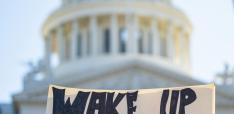Will Biden pass the America LEADS Act and start a new Cold War with China?

Jessica DiCarlo and Seth Schindler examine the Act that will accelerate America's economic confrontation with China.
US-China relations began to fray in the wake of the 2008 financial crisis, and tensions have soared under Donald Trump’s leadership. De-escalation is unlikely because it would require either China or the US to alter deeply entrenched policies. In recent years, the Chinese Government has expanded its influence across Eurasia by orienting economic activity towards supply chains anchored by its state-owned enterprises (SOEs). Chinese SOEs have invested heavily in transportation, logistics and digital infrastructure, and Beijing will seek to protect these assets. Meanwhile, there is a growing consensus within the US Government that China poses a significant threat to US interests, so the question is not whether but how Joe Biden will address the so-called ‘China Challenge.’
Joe Biden was a strong supporter of Obama-era policy towards China that balanced multilateral engagement with containment, but he evolved into a China sceptic on the campaign trail. While Biden will likely try to avoid further escalation and risk a military confrontation, he will face pressure to compete in key sectors. There are signs that Biden’s response to China will be a comprehensive and deliberate overhaul of state-business relations unprecedented in modern American history.
Just a month before the November election, thirteen Democratic Senators introduced the America LEADS Act in the Foreign Relations Committee. Senator Dick Durbin of Illinois explained that the act “lays out a coherent approach to China—working together where possible, standing up for human rights and democracy, and looking out for the American worker.” Its line items total approximately ten percent of the US Federal Government’s 2019 budget, and it amounts to a comprehensive industrial and foreign policy designed to confront “the geopolitical, strategic, economic, technological, and normative challenge that the Government of China, under President Xi Jinping’s leadership poses to the United States and to the global community” (sec. 4.3).
The primary objective of the Act is to enhance the competitiveness of American manufacturing. It provides substantial support for the reshoring of supply chains and programs for research and development in strategic sectors such as quantum computing, artificial intelligence, advanced manufacturing, semiconductors and microelectronics. A host of “workforce support” initiatives would fund apprenticeships and training programs in these sectors. Through the Manufacturing Regions Revival Program, the act targets places that have experienced deindustrialization in recent decades. Finally, it prioritizes the safeguarding of intellectual property through programs such as the Microelectronics Security Fund.
The Belt and Road Initiative is the centrepiece of China’s foreign policy, and the America LEADS Act would dramatically accelerate competition over large-scale infrastructure. Until now the US only half-heartedly competed with China in the global infrastructure sector. The BUILD Act was passed in 2018 and authorized the International Development Finance Corporation to support infrastructure projects in developing countries. However, it was only authorized to finance a portion of any single project, making it no match for state-backed Chinese banks that would fund projects in their entirety. The America LEADS Act authorizes the appropriation of “such sums as may be necessary” to “co-finance infrastructure projects that could otherwise be included in the Belt and Road Initiative” (sec. 118). This blank check for global infrastructure finance represents a step-change in American policy that would intensify the ongoing race to integrate frontiers of resource extraction and agro-industrial production.
Commentators have increasingly drawn parallels between US-China relations and the Cold War. Henry Kissinger recently said we are in the ‘foothills’ of a new Cold War, and Robert Kaplan announced that it had begun in early 2019, while others reject the comparison. What is vital here is not if there will be a new Cold War, but how such geopolitical rhetoric and rivalries generate new policies, strategies and capital flows. American officials recognize that they cannot simply resurrect Cold War era strategy. While there is talk of “deterrence” many of those officials are less sanguine about the prospects of “containing” China. Secretary of State Mike Pompeo recently stated American policy “isn’t about containment. Don’t buy that. It’s about a complex new challenge that we’ve never faced before. The USSR was closed off from the free world. Communist China is already within our borders.”
With this in mind, Washington DC may take a page out of Beijing’s playbook. China’s state-managed economy is commonly portrayed as a threat to free markets, yet the America LEADS Act demonstrates that the US political establishment may be amenable to a far more expansive role for the state. The US would not be alone if it significantly rebalanced state-market relations. Covid-19 has forced governments around the world to play a more direct role in the economy, challenging decades of liberalization and deregulation. The America LEADS Act offers a glimpse of one possible post-pandemic future characterized by intensified Sino-US competition and state capitalism with American characteristics.
Jessica DiCarlo is a doctoral candidate in the Department of Geography at the University of Colorado Boulder and was a Global China Fellow at Boston University’s Global Development Policy Center.
Seth Schindler is a Senior Lecturer in Urban Transformation at the Global Development Institute and
Manchester Urban Institute. Prior to joining the University of Manchester he coordinated the Global Studies Programme at Humboldt University of Berlin.


